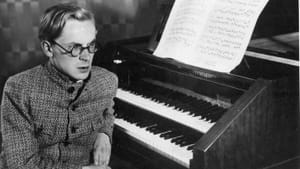Stay in the Loop
BSR publishes on a weekly schedule, with an email newsletter every Wednesday and Thursday morning. There’s no paywall, and subscribing is always free.
Bach with a dash of Bacchus
Bach Festival’s Cantata series

Kile Smith recently observed in BSR that there’s always a smile in Bach’s music, because “Bach knows that he’s blessed.” (Click here.) As a non-musician sitting in the audience, I have a slightly different attitude: Bach makes his audiences smile because he’s blessed in a certain way.
His music cheers us, no matter what the subject, because we can feel his sheer delight in his own creativity, in his ability to crowd a score with effect after effect. I can’t hear all the details the way a composer like Kile might, but I know I’m watching a six-ring circus, attracted by one detail here and another one over there, aware, even if I can’t analyze it, that it all adds up to a complex, exuberant, perfectly structured whole.
Bach’s cantatas are probably the best example of this unrestrainable joie de vivre. Some of their texts are relentlessly doleful, but we still leave the hall feeling glad we came.
This year the annual Bach Festival of Philadelphia is trying a new format. Instead of presenting an intense series of concerts, crowded into one or two weeks, director Matthew Glandorf is offering a series of monthly programs, on the fourth Wednesday of each month. Each Bach@7 concert features one Bach cantata as well as related works by Bach and other composers.
Spiritual wedding
The first Wednesday program, in September, focused on the wedding cantata that Bach may have composed for his own first nuptials. The second presented a funeral cantata, along with excerpts from Henry Purcell’s Ode on the Death of Queen Mary (of William and Mary fame). Wedding or funeral, the people who attended the post-concert reception in the rear of St. Mark’s Church seemed equally pleased.
The latest Wednesday program featured the cantata that Kile Smith discussed in his recent BSR essay: Cantata 140 or Sleepers Awake. Its subject is the Savior’s arrival, but the basic metaphor is a spiritual wedding. If you changed the text, the cantata would actually make a better wedding piece than the wedding cantata sung in September. The choral parts of 140 convey an excited processional quality, and the duet between the Soul and Jesus could (with a few alterations in the words) be transformed into a dialogue between a bride and bridegroom. Soprano Lesley Johnson and bass Jackson Williams did a beautiful job with the duet. The fact that they’re young enough to be the members of a wedding party themselves underlined the work’s secular overtones.
Harassed by Nazis
Glandorf programmed the cantata with an 18th Century oboe concerto by Alessandro Marcello, performed by Geoffrey Burgess, and a 20th Century choral work by Hugo Distler. The first movement of Marcello’s concerto seems perfunctory to my ear, but the slow movement flows the way a proper slow movement should, and the third movement delivers a brisk finale. The Baroque oboe is a beautiful instrument, with a sweetly reedy tone, and we should be grateful for any musician who makes the effort to master it.
Hugo Distler was a German composer who committed suicide in 1942, at age 34, after intense harassment by the Nazis. He was a leading figure in the revival of Renaissance and Baroque music, and Hitler’s followers felt there was something decadent about a penchant for the harpsichord.
Distler’s a capella choral work sets the same text as the choruses in Bach’s cantata and, like the Bach, communicates an overall joy heightened by the complexities of the music.
Glandorf describes the one hour Bach@7 concerts as an “Art Break.” The post-concert reception adds the perfect finishing touch, complete with some notably delectable wines, provided by a local wine merchant who offers his wares with the same enthusiasm that Bach lavishes on counterpoint. Bach would have fitted easily into this scene— mingling with his audience and his fellow musicians in the same way Glandorf and his musicians joined the party. Of course, Bach was the composer as ell as the organist and choir director. But composing was just part of his job in his day, along with chores like teaching music to the boys at the church school.
What, When, Where
Bach Festival of Philadelphia’s Wednesday@7 Cantata series: Marcello, Oboe Concerto in D minor; Distler, Wachet Auf; Bach, Cantata 140, Wachet auf, ruf uns die Stimme. Geoffrey Burgess, oboe; Leslie Johnson, soprano; Stephen Ng, tenor; Jackson Williams, bass. Philadelphia Bach Collegium chorus, Matthew Glandorf, artistic director. December 18, 2013 at Saint Mark’s Episcopal Church, 1625 Locust St. (267) 240-2586 or www.choralarts.com.
Sign up for our newsletter
All of the week's new articles, all in one place. Sign up for the free weekly BSR newsletters, and don't miss a conversation.

 Tom Purdom
Tom Purdom